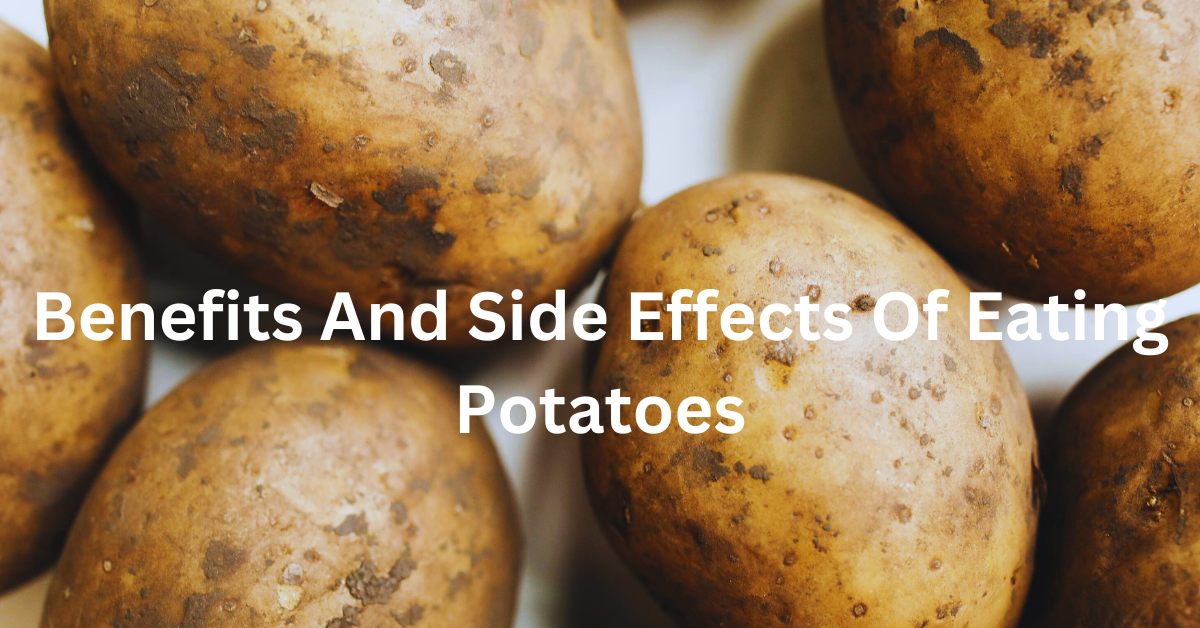Benefits Of Eating Potatoes
Eating potatoes can offer several health benefits:
- Nutrient Rich: Potatoes are a good source of vitamins and minerals, including vitamin C, vitamin B6, potassium, manganese, and dietary fiber. These nutrients play vital roles in maintaining overall health, supporting the immune system, promoting healthy digestion, and regulating blood pressure.
- High in Vitamin C: Potatoes are particularly rich in vitamin C, which acts as an antioxidant in the body, helping to protect cells from damage caused by free radicals. Adequate intake of vitamin C is essential for maintaining a healthy immune system and promoting collagen production, which is important for skin health and wound healing.
- Good Source of Potassium: Potatoes are one of the best sources of potassium, an essential mineral that helps regulate blood pressure by balancing the effects of sodium. Adequate potassium intake is associated with a lower risk of hypertension and cardiovascular disease.
- Dietary Fiber: Potatoes contain a significant amount of dietary fiber, especially when consumed with the skin. Fiber is important for digestive health, as it helps regulate bowel movements, prevents constipation, and supports the growth of beneficial gut bacteria. It also helps maintain healthy cholesterol levels and may reduce the risk of developing certain chronic diseases, such as heart disease and type 2 diabetes.
- Satiety and Weight Management: Despite their reputation as a starchy vegetable, potatoes can be a satisfying and filling addition to meals. The resistant starch found in potatoes may promote feelings of fullness and reduce appetite, which could aid in weight management when consumed as part of a balanced diet.
- Versatility and Affordability: Potatoes are a versatile ingredient that can be prepared in various ways, including boiling, baking, roasting, and mashing. They are also relatively inexpensive and widely available, making them an affordable option for adding nutrition to meals.
- Gluten-Free: For individuals with gluten intolerance or celiac disease, potatoes are a safe and naturally gluten-free food option.
However, it’s important to note that the health benefits of potatoes can vary depending on how they are prepared and consumed. Opting for healthier cooking methods like baking or boiling, and avoiding excessive amounts of added fats or sodium, can help maximize the nutritional benefits of potatoes.

Side Effect of Eating potatoes
While potatoes offer numerous health benefits when consumed as part of a balanced diet, there are some potential side effects associated with their consumption:
- Weight Gain: Potatoes are a starchy vegetable that can be relatively high in carbohydrates. Consuming large portions of potatoes, especially when prepared with added fats or in the form of fried foods like French fries or potato chips, can contribute to weight gain if not consumed in moderation.
- Blood Sugar Spikes: Potatoes have a high glycemic index, which means they can cause rapid spikes in blood sugar levels when consumed in large quantities or in highly processed forms. This can be particularly concerning for individuals with diabetes or those trying to manage their blood sugar levels.
- Digestive Issues: Some people may experience digestive discomfort, such as bloating, gas, or abdominal cramps, after consuming potatoes. This could be due to their high carbohydrate content, which can ferment in the gut and cause gas production in some individuals. Additionally, some people may have sensitivities or intolerances to certain compounds found in potatoes, such as solanine, which could trigger digestive symptoms in susceptible individuals.
- Acrylamide Formation: When potatoes are cooked at high temperatures, such as frying or baking at high heat, they can form acrylamide, a potentially harmful compound that forms during the Maillard reaction. Acrylamide has been classified as a probable human carcinogen by the International Agency for Research on Cancer (IARC). While the levels of acrylamide formed in cooked potatoes are generally low, minimizing exposure by opting for healthier cooking methods like boiling, steaming, or microwaving is advisable.
- Solanine Toxicity: Solanine is a naturally occurring toxic compound found in potatoes, particularly in the green parts and sprouts. Consuming high levels of solanine can cause symptoms such as nausea, vomiting, diarrhea, headaches, and in severe cases, neurological symptoms. It’s essential to avoid consuming potatoes that are green or have sprouts, as these indicate high levels of solanine.
- Allergic Reactions: While rare, some individuals may be allergic to potatoes, experiencing symptoms such as itching, hives, swelling, or even anaphylaxis after consumption. Allergic reactions to potatoes are more common in individuals with other plant allergies, such as latex or nightshade allergies.
As with any food, it’s important to consume potatoes in moderation as part of a balanced diet and to be aware of potential side effects or sensitivities. If you experience adverse reactions after consuming potatoes, it’s advisable to consult with a healthcare professional for guidance.
Reduce Your Risk
Reducing your risk of various health conditions involves adopting a balanced lifestyle that includes a nutritious diet, regular physical activity, adequate sleep, stress management, and avoidance of harmful habits. Here are some general tips to help reduce your risk of common health issues:
- Maintain a Healthy Diet: Consume a balanced diet rich in fruits, vegetables, whole grains, lean proteins, and healthy fats. Limit intake of processed foods, sugary beverages, and foods high in saturated and trans fats. Choose nutrient-dense foods like leafy greens, berries, nuts, seeds, and fatty fish.
- Stay Active: Engage in regular physical activity to maintain a healthy weight, improve cardiovascular health, strengthen muscles and bones, and boost mood. Aim for at least 150 minutes of moderate-intensity aerobic exercise or 75 minutes of vigorous-intensity exercise per week, along with muscle-strengthening activities on two or more days per week.
- Manage Weight: Maintain a healthy weight by balancing calorie intake with physical activity. If overweight or obese, aim to lose weight gradually through a combination of diet and exercise to reduce the risk of chronic diseases such as heart disease, type 2 diabetes, and certain cancers.
- Get Adequate Sleep: Prioritize quality sleep by aiming for 7-9 hours of sleep per night for adults. Establish a regular sleep schedule, create a comfortable sleep environment, and practice relaxation techniques to promote restful sleep. Poor sleep quality and duration are associated with an increased risk of obesity, heart disease, and mental health issues.
- Manage Stress: Practice stress-reduction techniques such as mindfulness meditation, deep breathing exercises, yoga, or hobbies that promote relaxation. Chronic stress can negatively impact physical and mental health, increasing the risk of conditions like hypertension, depression, and digestive disorders.
- Limit Alcohol and Avoid Smoking: Limit alcohol intake to moderate levels (up to one drink per day for women and up to two drinks per day for men) and avoid smoking and exposure to secondhand smoke. Both alcohol and tobacco use are major risk factors for various health conditions, including heart disease, cancer, and respiratory diseases.
- Regular Health Check-ups: Schedule regular health check-ups with your healthcare provider for screenings, vaccinations, and preventive care. Early detection and management of health conditions can significantly reduce the risk of complications and improve outcomes.
- Stay Hydrated: Drink plenty of water throughout the day to stay hydrated and support optimal bodily functions. Limit consumption of sugary drinks and caffeinated beverages, which can contribute to dehydration and adverse health effects.
Remember that everyone’s health needs are unique, so it’s essential to consult with a healthcare provider for personalized recommendations based on your medical history, risk factors, and lifestyle. By adopting healthy habits and making informed choices, you can significantly reduce your risk of developing various health conditions and improve overall well-being.
